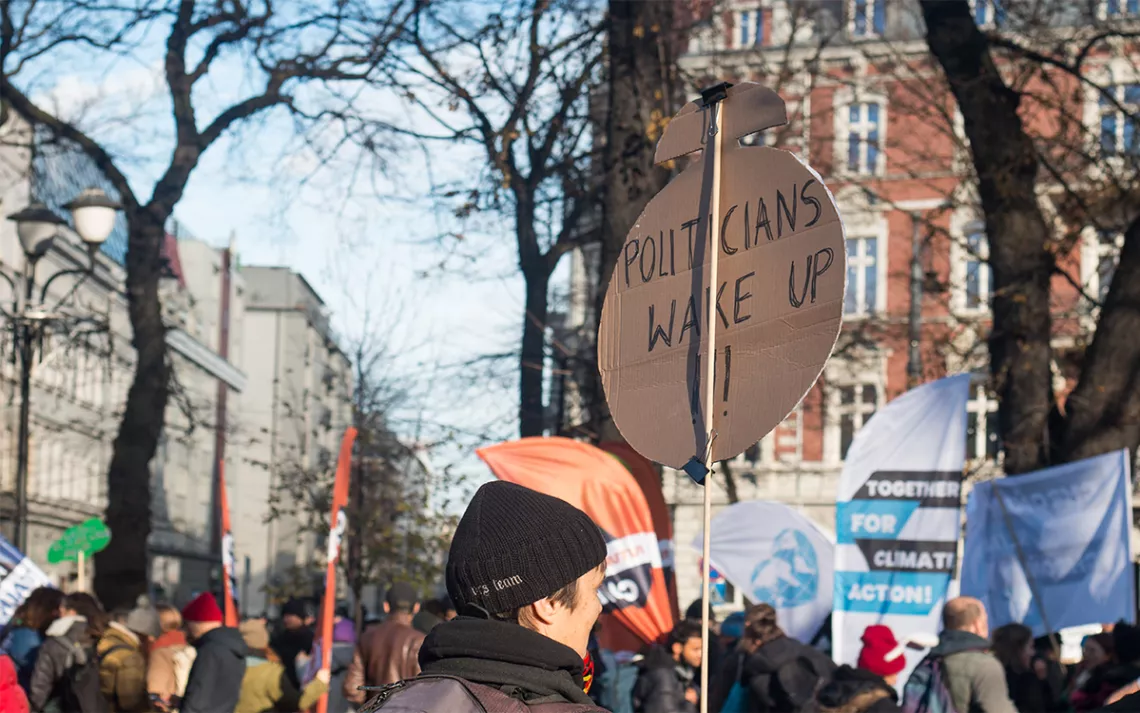Message to COP24 Delegates: Take Action on Climate Now
A young scientist speaks out against climate gridlock

Photo by Meghan Shea
Last Saturday, I watched country delegates at the UN COP24 climate conference in Katowice, Poland, argue over a single word in a single paragraph of a single article of a single session. And as a budding scientist, I am enraged.
At the center of this debate was a special report released by the Intergovernmental Panel on Climate Change (IPCC), the international scientific authority on climate research, in early October. This report analyzed thousands of scientific papers to determine which climate change impacts might be avoided by limiting global warming to 1.5°C instead of 2°C. The results were about as dramatic as technoscientific jargon can be.
Half a degree may not seem like much, but a 2°C world might be one without coral reefs and with almost triple the number of people exposed to severe heat than at 1.5°C. It’s already warmed 1°C since the 19th century, and at our current rates, we will likely cross the 1.5°C threshold in the 2040s. The next decade needs to usher in unprecedented innovations in energy systems and transportation—the IPCC report doesn’t claim it will be easy, but it says, barring political gridlock, that it might be possible.
But in a plenary hall filled with headset-clad delegates and observers, politics overshadowed the science. The Maldives, a small island nation in the Indian Ocean, advocated for the draft text to include stronger language to “welcome” the IPCC report rather than simply “note” it. One word: welcome versus note. Many other developing countries and small island states rushed to agree. But the US, Saudi Arabia, and Russia protested the change, voicing support for the current wording—one devoid of political impetus to act on the findings of the IPCC report. After a series of impassioned interventions, and a dramatic back-and-forth between Saudi Arabia and Tuvalu, the session was abruptly suspended.
As the debate unfolded, I perched on the back row of folding chairs, frantically tweeting and wondering how I had come to bear witness. I had stumbled on this particular plenary almost accidentally. This was my third COP meeting. I had attended earlier COPs as both an undergraduate at Stanford University and a master’s student at the University of Oxford, but it was my first time with accreditation to observe the negotiations themselves. After a week spent running between side events without ever watching the politics unfold, I picked a plenary to attend at random. I had been sitting through a rather uneventful series of announcements peppered with the chairman striking his gavel, lamenting that it felt like all of the action had already happened behind closed doors, when the Maldives took to the microphone, spurring the ensuing semantic chaos.
Following the pleas for stronger language, before my eyes and ears, a handful of negotiators devalued the work of 91 authors from 40 different countries of residence who synthesized over 6,000 scientific papers written by countless scientists. For as long as I can remember, I have wanted to be one of those authors, responsible for warning the world about climate change. And even though I have certainly realized that political maneuvering often subsumes the science, witnessing it in real time was like a punch to the stomach.
I am 24 years old. I have five to six years of PhD work ahead of me, at least, before I can begin my career as an oceanographer. At COP24 Young and Future Generations Day two days prior to the IPCC debate, I was told that the future is in the hands of us young people now. But that proclamation doesn’t square with the climate change timeline: We do not have time for the young activists of today to become the politicians and scientists and business leaders of tomorrow.
A few days earlier, Greta Thunberg, a Swedish 15-year-old who has been skipping school every Friday to protest her government’s inaction on climate change, told COP attendees that if supranational action “continues the way it is now, we are never going to achieve anything.” Sometimes it’s easier to draw inspiration from the action happening outside of the negotiations. The Greta Thunbergs. The Australian students protesting the Adani coal mine. The young children marching through the streets of Poland, gripping their parents with one hand and an “Our Goal: End Coal!” sign in the other.
But these stories of hope cannot and should not take pressure off the negotiators in Poland. The IPCC special report highlights that each action matters, that we need to be doing everything in our power to prevent a warming world—and that includes remaining invested in these oft-disheartening international negotiations.
Last Saturday, I watched country delegates at the UN COP24 climate conference in Katowice, Poland, argue over a single word in a single paragraph of a single article of a single session. And while these semantics seem trivial, the implications of the rejection of the best available science are enormous. So to the US, to Saudi Arabia, to Russia: Young people are here, we are watching, and we are not going away.
 The Magazine of The Sierra Club
The Magazine of The Sierra Club



